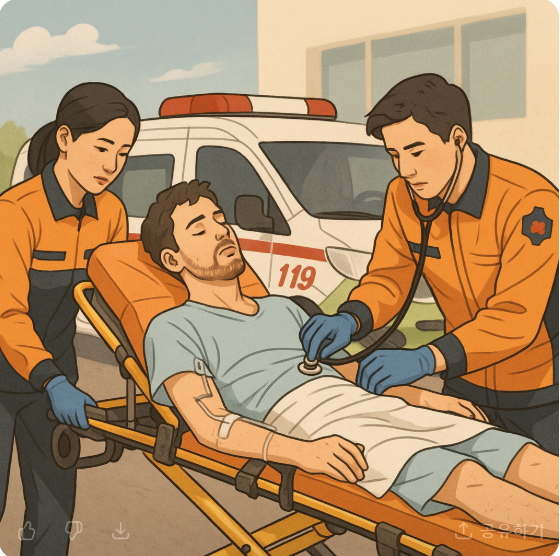🆘 Emergency Medical Support for Foreigners in Korea — A Complete Guide for 2025
※ This article is based on official information as of July 21, 2025.
Summary at a Glance
Emergency medical help in Korea is accessible for foreigners — but knowing the right steps, hotlines, and systems can make the difference between panic and peace. This post breaks it all down, step by step, in plain English — based on 2025’s official guidance.
Why This Matters
You’re far from home. It’s late. You’re in pain or someone you love needs urgent help — and suddenly, you’re not sure who to call, where to go, or whether your visa or lack of Korean skills will be a problem.
Medical emergencies are scary — even more so when you’re a foreigner in a new country.
That’s why emergency medical support for foreigners isn’t just helpful — it’s essential. And it’s available.
Let’s show you how it works in Korea — for real, without the sugarcoating.
Understanding Korea’s Emergency Medical System
🚨 Emergency Numbers You Must Know
There are three essential numbers you need in any Korean emergency:
- 119: Fire and ambulance (24/7, with English interpretation available)
- 1339: Korea Disease Control Center (KDCA) Medical Call Center — for medical advice & referrals
- 1345: Immigration & foreigner helpline (basic info, not for emergencies)
Pro tip: Save these numbers on your phone now.
Who Can Access Emergency Medical Services?
Even if you’re undocumented, on a tourist visa, or waiting for your ARC (Alien Registration Card), emergency medical support cannot be denied. Korean law requires hospitals to provide immediate care in life-threatening cases, regardless of your status.
However, follow-up care or longer hospitalization may require:
- Proof of travel insurance
- Korean National Health Insurance (if applicable)
- Or out-of-pocket payment
Real Case: “I Was Hit by a Taxi in Seoul”
“I was on a working holiday visa, walking through Hongdae at night. A taxi clipped my leg — I fell hard. A friend called 119. The ambulance came fast, the paramedics were kind, and I was treated at Severance Hospital.
I didn’t have Korean insurance, but my home-country travel insurance covered it all. I just had to submit receipts.”
– Anonymous, Canadian traveler, 2024
Where to Go for Urgent Help
1. Regional Emergency Medical Centers (EMCs)
- Available nationwide (over 450 designated locations)
- Equipped for trauma, strokes, heart attacks, etc.
- Staff may speak limited English; some hospitals offer interpretation support
Find a center here (MOHW Official Map)
2. International Clinics
Major hospitals in Seoul and Busan have foreigner-friendly ERs:
- Severance Hospital (Shinchon)
https://www.yuhs.or.kr - Samsung Medical Center
https://www.samsunghospital.com - Seoul National University Hospital (SNUH)
https://www.snuh.org
If You Need an Ambulance
Call 119 and say clearly:
“Ambulance, [your location], foreigner, English help.”
They will attempt to connect you with an interpreter. Paramedics are well-trained but may not speak fluent English — so use simple words and stay calm.
Insurance, Payment & What to Expect
🩺 What if I Have No Insurance?
- You will not be refused emergency care.
- However, you must pay later — and the bill could be high.
- Receipts will be given for possible reimbursement.
🩺 What if I Have Travel Insurance?
- Present your insurance certificate or policy number.
- Pay upfront, then claim refund from your home provider.
- Some Korean hospitals may bill your provider directly.
🩺 What if I Have Korean NHIS?
- Your out-of-pocket cost will be significantly lower.
- NHIS covers emergency care, ambulance, and hospitalization.
Language Barriers: Help Is Available
Interpretation Services
- BBB Korea (1588-5644): Free 24/7 interpretation in 20+ languages
http://www.bbbkorea.org - HiKorea and Immigration Offices can also assist in follow-up care issues.
How to Prepare in Advance
✅ 5 Emergency Prep Tips for Foreigners
- Save emergency numbers in your phone (119, 1339, embassy)
- Keep your ARC or passport on you at all times
- Register with your embassy in Korea for added support
- Take photos of insurance documents on your phone
- Know your blood type and allergies in Korean (write it down)
Regional Differences: Seoul vs Countryside
- In Seoul, interpretation is more likely, and international services are better.
- In rural areas, language barriers can be tougher. Bring a Korean-speaking friend or use Google Translate with medical terminology loaded in.
How to Apply for Follow-Up Support After Emergency
If you’re admitted or need continued treatment:
- Ask the hospital if they accept NHIS or travel insurance
- Contact your embassy if needed for emergency funds or legal help
- File a report or claim through HiKorea (www.hikorea.go.kr) or MOHW
Official Links You Need
- Emergency Medical Center Map: https://www.e-gen.or.kr
- KDCA (Medical Info & Epidemics): https://www.kdca.go.kr
- BBB Korea: http://www.bbbkorea.org
- Ministry of Health and Welfare: https://www.mohw.go.kr
A Last Line to Keep in Mind
Emergencies don’t wait for language apps or visa approvals. But with a little preparation, you can face the unexpected with clarity — and get the care you need, when you need it most.
One Thing Worth Sharing
If you know a foreigner living in Korea, share this post.
You might just save a life — maybe even your own.
